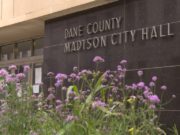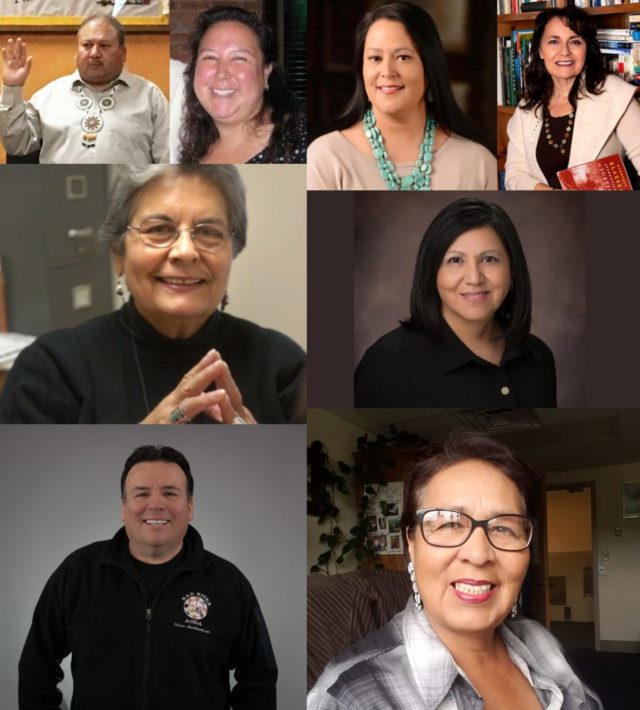This is the third of a five-part series. Part 2 is available here.
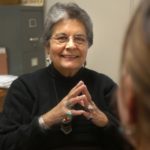 Ada Deer, a longtime champion of Native American rights, human rights and social justice, was the first woman to head the U.S. Bureau of Indian Affairs and the first Native American woman from Wisconsin to run for United States Congress. A member of the Menominee tribe, Deer was born in Keshena, Wisconsin in 1935. She earned a bachelor’s degree from the University of Wisconsin-Madison and a Master of Social Work from the New York School of Social Work (later Columbia University School of Social Work). In 1992, Ada became the first American Indian woman to win the nomination of a major political party for Congress, when she won the Democratic nomination for the 2nd District. After losing the general election, Ada applied for and became the assistant secretary for Indian Affairs for President Bill Clinton—the first woman to hold the position. During her tenure, 226 Alaskan Native villages, as well as American Indian tribes in California and Michigan, received federal recognition. This past January, Deer was honored with the City-County Reverend Dr. Martin Luther King, Jr. Humanitarian Award given to Madison-area community members who reflect the values of Dr. Martin Luther King, Jr. Deer is also the author of a memoir, Making a Difference: My Fight for Native Rights and Social Justice. As an educator and social worker, she taught classes at the UW-Madison School of Social Work and, in 2000, she became director of the American Indian Studies Program.
Ada Deer, a longtime champion of Native American rights, human rights and social justice, was the first woman to head the U.S. Bureau of Indian Affairs and the first Native American woman from Wisconsin to run for United States Congress. A member of the Menominee tribe, Deer was born in Keshena, Wisconsin in 1935. She earned a bachelor’s degree from the University of Wisconsin-Madison and a Master of Social Work from the New York School of Social Work (later Columbia University School of Social Work). In 1992, Ada became the first American Indian woman to win the nomination of a major political party for Congress, when she won the Democratic nomination for the 2nd District. After losing the general election, Ada applied for and became the assistant secretary for Indian Affairs for President Bill Clinton—the first woman to hold the position. During her tenure, 226 Alaskan Native villages, as well as American Indian tribes in California and Michigan, received federal recognition. This past January, Deer was honored with the City-County Reverend Dr. Martin Luther King, Jr. Humanitarian Award given to Madison-area community members who reflect the values of Dr. Martin Luther King, Jr. Deer is also the author of a memoir, Making a Difference: My Fight for Native Rights and Social Justice. As an educator and social worker, she taught classes at the UW-Madison School of Social Work and, in 2000, she became director of the American Indian Studies Program.
 Dawn Vick is a member of the Ho-Chunk Nation and for over 19 years, has served the Division of Intergovernmental Relations for the Wisconsin Department of Administration. Vick’s tenure at the department has supported relationships between the state and the governments of the 11 Native American tribes throughout Wisconsin. Vick has also served the department as an Outreach Specialist for Federal and State Relations, where she sought to secure federal funding for local projects. Vick has earned a bachelor’s degree in organizational management from Viterbo University and an MBA in Business Administration from Colorado State University.
Dawn Vick is a member of the Ho-Chunk Nation and for over 19 years, has served the Division of Intergovernmental Relations for the Wisconsin Department of Administration. Vick’s tenure at the department has supported relationships between the state and the governments of the 11 Native American tribes throughout Wisconsin. Vick has also served the department as an Outreach Specialist for Federal and State Relations, where she sought to secure federal funding for local projects. Vick has earned a bachelor’s degree in organizational management from Viterbo University and an MBA in Business Administration from Colorado State University.
 Mike Wiggins Jr. is the Chairman of the Bad River Band of Lake Superior Chippewa. Wiggins is also a major advocate for the conservation of natural resources. Before becoming the chairman of the Bad River Band, Wiggins served as a conservation warden for the Great Lakes Indian Fish and Wildlife Commission. Today, he is a vocal leader in the protection of the Penokee Hills and maintaining safe groundwater. In 2019, Wiggins was named an Outstanding Alumni of UW-Superior. Wiggens got his bachelor’s degree from UW-Superior in 1992.
Mike Wiggins Jr. is the Chairman of the Bad River Band of Lake Superior Chippewa. Wiggins is also a major advocate for the conservation of natural resources. Before becoming the chairman of the Bad River Band, Wiggins served as a conservation warden for the Great Lakes Indian Fish and Wildlife Commission. Today, he is a vocal leader in the protection of the Penokee Hills and maintaining safe groundwater. In 2019, Wiggins was named an Outstanding Alumni of UW-Superior. Wiggens got his bachelor’s degree from UW-Superior in 1992.
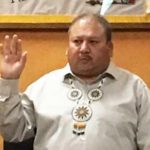 Joseph Wildcat Sr. has been President of the Lac du Flambeau Band of Lake Superior Chippewa since 2016. He is a lifelong resident of the Lac du Flambeau Indian Reservation. The 108-square-mile reservation, established in 1854, is home to about 2,400 Lac du Flambeau members as well as Lake of the Torches Resort and Casino, George W. Brown, Jr. Ojibwe Museum & Cultural Center, Waaswaaganing Indian Bowl Living Arts and Culture Center and other tribal enterprises.
Joseph Wildcat Sr. has been President of the Lac du Flambeau Band of Lake Superior Chippewa since 2016. He is a lifelong resident of the Lac du Flambeau Indian Reservation. The 108-square-mile reservation, established in 1854, is home to about 2,400 Lac du Flambeau members as well as Lake of the Torches Resort and Casino, George W. Brown, Jr. Ojibwe Museum & Cultural Center, Waaswaaganing Indian Bowl Living Arts and Culture Center and other tribal enterprises.
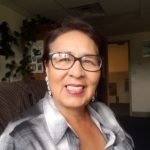 Bobbi Webster is a member of the Oneida Nation and has been the Public Relations Director for the Nation since 1995. Webster has served the Oneida Nation in a number of capacities over the years. She has worked with the Oneida Language Program and taught the Oneida Language in public schools. She has also served as the editor of the Oneida newspaper, Kalihwisaks. Webster has over 35 years of communications experience and has committed her time and expertise to strengthen the Oneida Nation.
Bobbi Webster is a member of the Oneida Nation and has been the Public Relations Director for the Nation since 1995. Webster has served the Oneida Nation in a number of capacities over the years. She has worked with the Oneida Language Program and taught the Oneida Language in public schools. She has also served as the editor of the Oneida newspaper, Kalihwisaks. Webster has over 35 years of communications experience and has committed her time and expertise to strengthen the Oneida Nation.
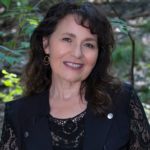 Kimberly Blaeser, a member of the Minnesota Chippewa tribe, is a Native American poet and author. She is a professor at the University of Wisconsin-Milwaukee where she teaches creative writing and Native American Literatures. From 2015-16 she served as the Wisconsin Poet Laureate and published three collections of poetry including “Apprenticed to Justice,” “Absentee Indians and Other Poems” and “Trailing You.” She is an editorial board member for the “American Indian Lives” series of the University of Nebraska Press and for the “Native American Series” of Michigan State University Press and serves on the boards of directors for the Wisconsin Academy of Sciences, Arts, and Letters and the Aldo Leopold Foundation. Blaeser was named a 2020 Fellow by the Wisconsin Academy of Sciences, Arts, and Letters, and has received both a Distinguished Public Service Award and an Outstanding Woman of Color Award from the University of Wisconsin. Blaeser is currently at work on a collection of “Picto-Poems” which combines her photographs and poetry, according to her website.
Kimberly Blaeser, a member of the Minnesota Chippewa tribe, is a Native American poet and author. She is a professor at the University of Wisconsin-Milwaukee where she teaches creative writing and Native American Literatures. From 2015-16 she served as the Wisconsin Poet Laureate and published three collections of poetry including “Apprenticed to Justice,” “Absentee Indians and Other Poems” and “Trailing You.” She is an editorial board member for the “American Indian Lives” series of the University of Nebraska Press and for the “Native American Series” of Michigan State University Press and serves on the boards of directors for the Wisconsin Academy of Sciences, Arts, and Letters and the Aldo Leopold Foundation. Blaeser was named a 2020 Fellow by the Wisconsin Academy of Sciences, Arts, and Letters, and has received both a Distinguished Public Service Award and an Outstanding Woman of Color Award from the University of Wisconsin. Blaeser is currently at work on a collection of “Picto-Poems” which combines her photographs and poetry, according to her website.
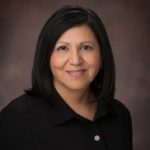 Karen Lincoln Michel, a member of the Ho-Chunk Nation, was recently named President of Indian Country Today, where she oversees the business side of a nonprofit news site that covers indigenous communities. She was editor of Madison Magazine since 2015 and was named publisher in 2018. Michels also served as the 2017-2019 Board President for the Wisconsin Center for Investigative Journalism (WCIJ). She has editorial experience with publications including the La Crosse Tribune, The Dallas Morning News, The New York Times Syndicate, the Green Bay Press-Gazette and as executive editor of The Daily Advertiser in Lafayette, Louisiana. Michels is also the past president of both UNITY: Journalists for Diversity and the Native American Journalists Association.
Karen Lincoln Michel, a member of the Ho-Chunk Nation, was recently named President of Indian Country Today, where she oversees the business side of a nonprofit news site that covers indigenous communities. She was editor of Madison Magazine since 2015 and was named publisher in 2018. Michels also served as the 2017-2019 Board President for the Wisconsin Center for Investigative Journalism (WCIJ). She has editorial experience with publications including the La Crosse Tribune, The Dallas Morning News, The New York Times Syndicate, the Green Bay Press-Gazette and as executive editor of The Daily Advertiser in Lafayette, Louisiana. Michels is also the past president of both UNITY: Journalists for Diversity and the Native American Journalists Association.
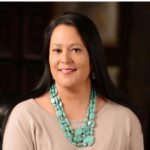 Shannon Holsey is the President of the Stockbridge-Munsee Band of Mohican Indians. She was elected as president in October 2015, following eight years as a member of the Tribal Council. Holsey is the youngest to ever lead the Stockbridge-Munsee, which has about 1,470 enrolled members and is one of 11 Native tribes in Wisconsin. The Stockbridge-Munsee Tribe is the largest employer in Shawano County. She grew up on the Stockbridge-Munsee reservation in Bowler, Wisconsin. Holsey also serves as vice president of the Great Lakes Inter-Tribal Council, which represents 11 member tribes with a land base of about one million acres spanning 45 counties. She is appointed as the Wisconsin State Legislature’s Special Committee on State-Tribal Relations. Hosley is also Co-founder of the Midwest region Woodland Women WEWIN Chapter.
Shannon Holsey is the President of the Stockbridge-Munsee Band of Mohican Indians. She was elected as president in October 2015, following eight years as a member of the Tribal Council. Holsey is the youngest to ever lead the Stockbridge-Munsee, which has about 1,470 enrolled members and is one of 11 Native tribes in Wisconsin. The Stockbridge-Munsee Tribe is the largest employer in Shawano County. She grew up on the Stockbridge-Munsee reservation in Bowler, Wisconsin. Holsey also serves as vice president of the Great Lakes Inter-Tribal Council, which represents 11 member tribes with a land base of about one million acres spanning 45 counties. She is appointed as the Wisconsin State Legislature’s Special Committee on State-Tribal Relations. Hosley is also Co-founder of the Midwest region Woodland Women WEWIN Chapter.
Part 4 coming tomorrow!




